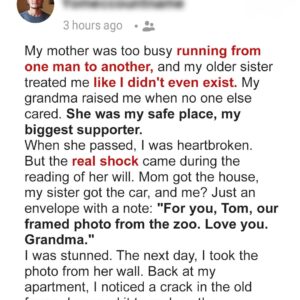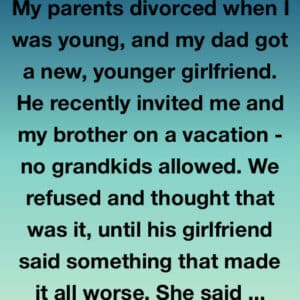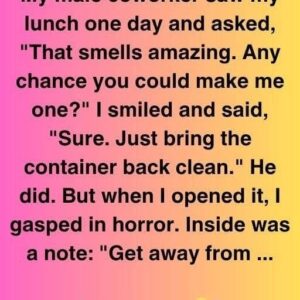Seven years after the crash that took Adira, I was doom-scrolling in bed when my screen lit up with a text from her number. First came a photo: the two of us at her 16th birthday, frosting smeared across our noses, laughing like the future couldn’t touch us.
I typed: Who is this?
Three dots appeared. Then: Check your mailbox.
Midnight had tucked the cul-de-sac to sleep. Every porch light was out. I live at the dead end; the curb is thirty steps away and felt like a mile. Still, I went—barefoot, hoodie over mismatched pajamas—like the girl in a horror movie who should know better.
Inside the box: a manila envelope. No stamp. My name across the front in blue gel pen—the exact pens Adira used to hoard.
My heart climbed into my throat. On the sidewalk, hands shaking, I opened it.
Five glossy prints slid out. Ninth-grade choir trip. Her mom’s rooftop during the summer of bad bangs. That foam party we lied our way into, both of us grinning like we’d robbed a bank. And then a photo from a life she wasn’t in: me at my cousin’s wedding last year, blue clearance-rack dress, mid-laugh—shot from behind a pillar.
I didn’t feel my feet until I was inside again, deadbolt thrown, chain on. I called the number.
One ring. “Hey. It’s me.”
I almost dropped the phone. “Who is this? This isn’t—”
“It’s Adira.” Softer, like coaxing a skittish cat. “I can explain. But I need to see you.”
Memory recognized the voice before my head could. She told me to meet her at the old lookout—the cliff where we used to pass contraband wine coolers and talk like we owned the sky. Then she hung up.
I didn’t sleep. At 4:30 I drove. Dawn had only smudged the horizon. A silver sedan idled by the guardrail. Someone sat on the hood, hood up, ankles crossed.
She looked up. My keys hit the asphalt.
Same wild curls. Same freckle above her lip. Same tired, knowing eyes.
“You died,” I said, because my brain had nothing else.
She nodded. “I was supposed to.”
I stood shivering until she patted the hood beside her. Sit, please.
She told me what the obituary didn’t.
The night of the crash she wasn’t alone. She was in a car with a man she had no business with—Mateo. Older. Married. The kind of dangerous that wears a clean shirt. They fought. He drank. The car rolled twice into a ravine. She crawled out. He didn’t.
“I panicked,” she said. “My head was bleeding. My phone was gone. I thought I’d killed him. I didn’t know how to be the person who calls the police and waits.” Shame and fear did the rest. She walked. Hitchhiked. Dyed her hair in a motel sink. Tried on names like borrowed jackets. Oregon. New Mexico. Oklahoma. She watched my life from the edges: when I got into nursing school, when my dad got sick. A hundred times she almost reached out. A hundred times fear said no.
“Why now?” I asked as the sun hauled color up the valley.
“Leukemia.” She said it like a confession. “Late-stage.” Her voice wobbled for the first time. “I wanted you to hear it from me. And… I need a favor.”
That afternoon we drove into the city. She wouldn’t say where until we parked in front of a brick duplex in East Haven. A woman stepped onto the stoop with a little boy at her side. Five, maybe. Brown eyes too big for his face. A careful smile.
“This is Layla,” Adira said. “And that’s Kian. My son.”
Air stalled in my chest. Layla was his foster mom. She’d taken him after Adira collapsed at her diner shift and the hospital realized there was no “next of kin.”
“I don’t want him lost in the system,” Adira whispered. “I don’t want him alone when I’m gone.” She looked at me. “Unless you… unless you’d want…”
Only if you want to. Only if you can. The sentence hung between us like a rope over a canyon.
The weeks that followed were a blur of forms, home visits, and the kind of questions that measure the size of your yes. Kian started coming for dinner, then weekends. He loved dinosaurs and puzzles and drawing maps that only he could read. The first time he called me Tita Rana, I sat in my car afterward and cried until the steering wheel went slick.
Adira and I lived inside the hours like they were breakable. We baked awful brownies. We watched old movies too quiet for the neighbors. We drank ginger tea and traded silences. We didn’t autopsy the missing years. We made a small, fierce present instead.
She didn’t get better. She stayed longer than the doctors promised. One night we watched a grainy video from our choir trip—voices wobbling through harmony, faces bright with a joy that didn’t know its expiration date. Her finger hovered over my face on the screen.
“You were always the best part,” she said.
She died the next morning, in her sleep, mouth soft, as if the relief had finally made room.
Two years have slid by since. Kian started second grade last week. He builds Lego cities with working traffic systems and is currently obsessed with robotics. He keeps a photo of Adira in his backpack and a plastic stegosaurus in his pocket because it “protects from bad dreams.” Every night we light a candle and tell her about our day—his spelling quiz, a difficult patient I held a hand for, whether the neighbor’s cat colonized our porch chair again. Sometimes, when he colors, he hums the tune Adira used to sing while flipping pancakes. Muscle memory of love, replaying itself.
I kept her number. That first text sits pinned at the top of our thread, a doorway I can still knock on. Some evenings I drive to the lookout, sit on the hood, and watch light pour over the ridge. It doesn’t haunt me there. It feels like being chosen. Like her detour still led me home.
Adira wasn’t a saint. She ran when she should’ve called. She let fear shrink her life. But when it counted, she told the truth and handed me her heart in the shape of a boy with brown eyes and a dinosaur in his fist.
Losing her cracked me open enough to fit more love inside. People vanish. People return. Sometimes they break you in the places where the light needs an opening.
So if an old number pings your phone with a fragment of your past, listen. It might not be a ghost. It might be someone finally brave enough to come home.
And if this tugged at something you’ve kept tucked away, send it to the person you miss. Second chances have a way of finding people who are ready to say yes.





